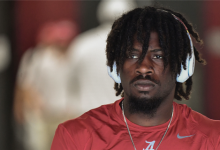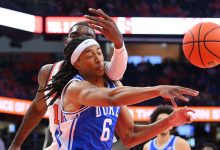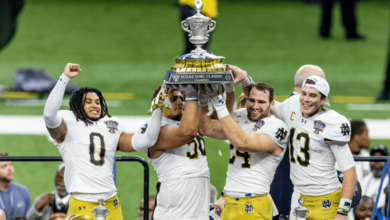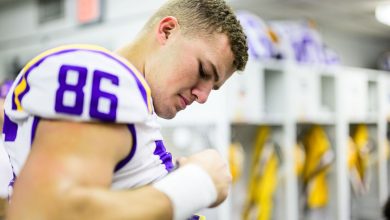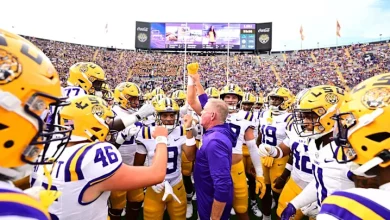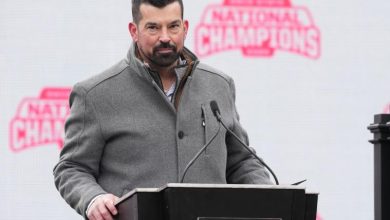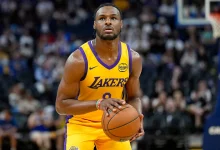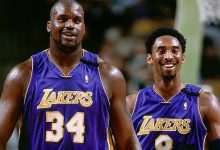Ravens’ John Harbaugh Expresses Displeasure Over Lamar Jackson’s Potential Participation in Flag Football at 2028 Olympics.
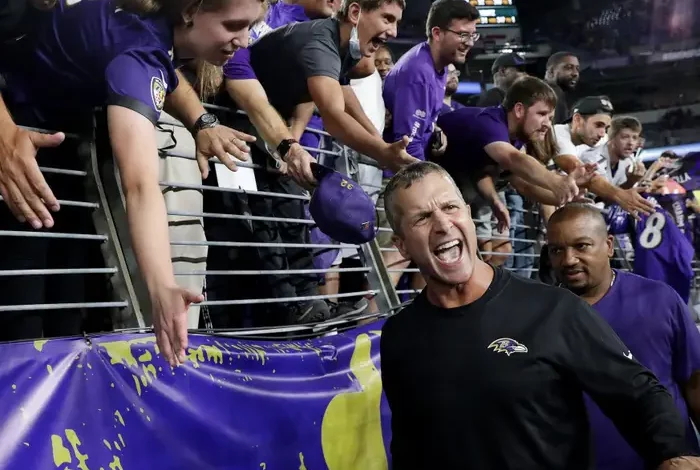
In the world of professional sports, the decision of whether athletes should participate in extracurricular events, particularly events outside their primary sport, often sparks debate. One such issue has emerged surrounding Baltimore Ravens quarterback Lamar Jackson and his potential participation in flag football during the 2028 Summer Olympics. While the International Olympic Committee (IOC) has recently approved flag football as a new sport for the 2028 Los Angeles Olympics, not everyone is on board with the idea, particularly Ravens’ head coach John Harbaugh.
Harbaugh, a coach known for his straightforward approach and concern for his players’ well-being, has publicly expressed his reservations about Jackson’s potential involvement in the Olympic flag football competition. While flag football is gaining traction as a growing sport, especially with its inclusion in the Olympics, Harbaugh’s primary concern revolves around the risks and commitments involved, especially when it comes to one of the most dynamic quarterbacks in the NFL today.
The Olympic Flag Football Debate
Flag football has been recognized as an official Olympic sport for the first time in 2028, and its inclusion marks a milestone for the sport. Flag football has been growing in popularity across the world and has seen an increase in participation at youth, amateur, and professional levels. However, as with any new sport entering the Olympics, there are mixed reactions, particularly from the professional leagues whose players are among the top global talents in the sport.
For someone like Lamar Jackson, who has established himself as one of the most exciting and dynamic quarterbacks in the NFL, the prospect of playing flag football in the Olympics raises questions about his long-term commitment to football and the risks involved in playing an additional high-profile sport during the offseason. Though flag football may not involve the same level of physical contact as tackle football, it still presents its own set of risks, including injuries that could impact Jackson’s performance during the regular NFL season.
John Harbaugh’s Concern for Jackson’s Future
John Harbaugh, the Ravens’ head coach, is a coach known for his close relationship with his players, particularly with Lamar Jackson, who has been the face of the franchise since he took over as the starting quarterback in 2018. Harbaugh’s primary concern about Jackson participating in flag football at the Olympics is the possibility of injury. Even though flag football is a less-contact sport compared to traditional tackle football, it still requires agility, speed, and explosive movements that could potentially lead to sprains, strains, or other injuries.
“Lamar is one of the most unique and talented athletes in the NFL, and I want him focused on being the best quarterback he can be for the Ravens,” Harbaugh said in a recent interview. “The Olympics are a tremendous honor, but the timing of it, the risk of injury—these are all things we have to consider seriously. I just don’t know if it’s worth it for him to put himself in a position where he could risk a serious injury.”
Harbaugh’s concerns about Jackson’s health are not unfounded. The NFL is an incredibly demanding sport, and the physical toll it takes on players throughout the season can be immense. The last thing the Ravens want is for Jackson to sustain an injury that could derail their chances for success in the NFL. While flag football might not be as physically grueling as full-contact football, it still places a strain on the body, particularly for a player of Jackson’s caliber, who relies heavily on his mobility and ability to evade defenders.
Lamar Jackson’s Legacy and Commitment to the Ravens
Lamar Jackson is at the peak of his career and is regarded as one of the most electrifying quarterbacks in the NFL. His dynamic ability to extend plays with his legs, combined with his ability to throw deep passes, has revolutionized the quarterback position and made him a fan favorite across the league. His 2019 NFL MVP award solidified his place among the greats of the game, and he has since become the cornerstone of the Ravens’ offense.
Jackson’s rise to stardom has been built on his unique playing style, and his success has been a testament to his work ethic, dedication, and understanding of the game. But with that success comes a level of responsibility and scrutiny. As the face of the franchise, Jackson’s decisions off the field carry significant weight, not only for his career but for the future of the Ravens organization.
Harbaugh, understanding the importance of Jackson’s role, has emphasized that Jackson’s primary focus should be on the Ravens and the NFL season. Jackson, who has yet to win a Super Bowl, has stated that his ultimate goal is to bring a championship to Baltimore. The NFL season is long, and as a quarterback, Jackson shoulders a significant amount of responsibility, both physically and mentally. With the Ravens looking to make a deep playoff run, Harbaugh’s message is clear: the focus needs to remain on football.
The Timing of the Olympics and NFL Season
Another important factor to consider in this debate is the timing of the Olympics and the NFL season. The 2028 Summer Olympics will take place during the NFL offseason, which may seem like a natural window for athletes to participate in non-NFL activities. However, for someone like Lamar Jackson, maintaining peak physical condition and being ready for training camp are crucial components of success.
The offseason for NFL players is a time for rest, recovery, and intense training to prepare for the next season. Adding a commitment like the Olympics could interfere with Jackson’s preparation for the NFL season, potentially leading to burnout or fatigue. For a player of Jackson’s caliber, every minute of the offseason is critical to maintaining the level of performance that has made him one of the most exciting quarterbacks in the NFL.
In addition, there is the issue of recovery time. The physical demands of playing football in the NFL, particularly for a mobile quarterback like Jackson, can take a toll on his body. Engaging in flag football, or any additional physical activity, may delay Jackson’s recovery, which could impact his performance when the season starts.
The Potential for Injury in Flag Football
While flag football is significantly less physically demanding than traditional tackle football, it is not without risk. The sport still involves a lot of fast-paced movements, including sprinting, cutting, and quick directional changes. In addition, players often engage in physical contact, particularly in high-pressure situations when attempting to evade defenders or make crucial plays. For Lamar Jackson, who relies heavily on his agility and ability to make plays with his legs, even a small injury could impact his ability to perform at his best.
Furthermore, Jackson’s playing style is uniquely dependent on his ability to escape pressure and extend plays. A minor injury sustained while playing flag football could affect his agility, throwing motion, or even his confidence in the pocket. Considering the high stakes for the Ravens in each season, Harbaugh’s concerns about Jackson’s involvement in flag football are rooted in the reality that the risks of injury, even in a non-contact sport, can have long-term consequences.
What Does This Mean for Lamar Jackson’s Future?
Despite Harbaugh’s concerns, the decision ultimately rests with Lamar Jackson. For an athlete like Jackson, the allure of representing his country on the global stage at the Olympics could be a tempting opportunity. Flag football, despite its limited history in the Olympic Games, could serve as a platform for Jackson to further solidify his legacy as one of the most versatile athletes in the world.
However, Jackson will need to weigh the potential rewards against the risks. His decision will likely involve careful consideration of his future with the Ravens, his health, and his commitment to his NFL career. If Jackson were to participate in the Olympics, it would undoubtedly be a thrilling experience for fans and an opportunity to see a dynamic athlete compete on the world stage. However, it could also complicate his preparation for the upcoming NFL season, which Harbaugh and the Ravens are not willing to take lightly.
John Harbaugh’s concerns about Lamar Jackson’s potential participation in flag football during the 2028 Olympics are understandable, given the demands of the NFL season and the risks associated with any type of physical competition. While flag football is a less-contact sport, it still presents the potential for injury, and for a player like Jackson, who relies on his agility and mobility, the risks may outweigh the rewards.
As Jackson continues to be one of the most exciting quarterbacks in the league, his decisions regarding his future will have a significant impact not only on his career but on the future of the Ravens as well. The opportunity to play in the Olympics is a once-in-a-lifetime opportunity, but whether it aligns with Jackson’s ultimate goals in the NFL remains to be seen. Regardless of his decision, Harbaugh’s primary focus will always be on ensuring that Lamar Jackson remains healthy and ready to lead the Ravens to success in the NFL.

